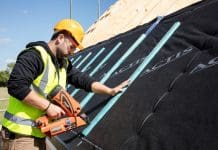Keystone’s commitment to innovating the industry has been demonstrated once again by the introduction of an advanced version of its award-winning Hi-therm Lintel
Keystone Group National Technical & Specification Manager Richard Kinloch explains how this new version secures all the benefits of the original and adds new features, widening its appeal.
Hi-therm has won multiple awards for its innovation and made a significant impact on the energy efficiency of new homes. Now, its design has been upgraded to offer even greater practicality to builders and to make its benefits open to even more projects.
Richard explains: “The need to address thermal bridging is becoming a mainstream requirement and is boosting the need for advanced thermally efficient lintels. Our R&D team has continued in its quest for perfection and the new, redesigned Hi-therm+ Lintel helps meet the growing demand onsite for compliance with Part L 2013 regulations.
“The innovative design of the Hi-therm+ Lintel, while still utilising a rigid polymer thermal insulator as an effective thermal break, now incorporates a steel inner and external leaf. The product is as thermally efficient as the original but is now similar to a standard steel lintel for simplified installation.”
How can a lintel make so much impact?
The increasing focus on thermal bridging means that product selection needs to be carefully considered. Lintels are in most cases the most significant non-repeating thermal bridges in a dwelling, as traditional style lintels interrupt the line of insulation with a continuous piece of highly conductive steel. Hi-therm’s patented design uniquely combines the low thermal transmission properties of a rigid polymer with the structural strength of steel, producing a lintel that practically eliminates cold bridging and delivers important CO2 savings within SAP, enabling compliance with new, more stringent building regulations.
The Hi-therm lintel has a low Psi value, which then has a positive effect on the SAP calculation. This in turn gives designers flexibility to choose less onerous wall U-values and glazing specifications. Designers can value engineer their building specification while maintaining compliance with building regulations.
Psi value calculator
Keystone offers an online Psi value calculator designed with energy assessors and architects in mind. With this calculator users can obtain a Psi value with just a few clicks of a button, completely free of charge. You can access our psi value calculator here.
Importance of Psi values
The thermal performance of a lintel is expressed in terms of a psi value, commonly known as thermal bridging. Specifically calculated Psi values, as opposed to default Psi values, will help to lower the thermal bridging Y-value within the SAP calculation, assisting with Part L compliance. To ensure accuracy, all Psi value calculations have been generated by trained thermal modellers using Physibel Trisco software.
Inputting the exact Psi value of Hi-therm into the SAP calculations may negate the need for more costly solutions, such as mechanical systems or enlarged cavities. This offers an alternative to existing sustainable technologies, helping to deliver the total building performance required by current and future changes in building regulations.
For further information please email info@keystonelintelsuk.com or call the office 01283 200150.
Richard Kinloch
National Specification Manager
Keystone Lintels
Tel: 01283 200 150
Please note: this article is a commercial profile














